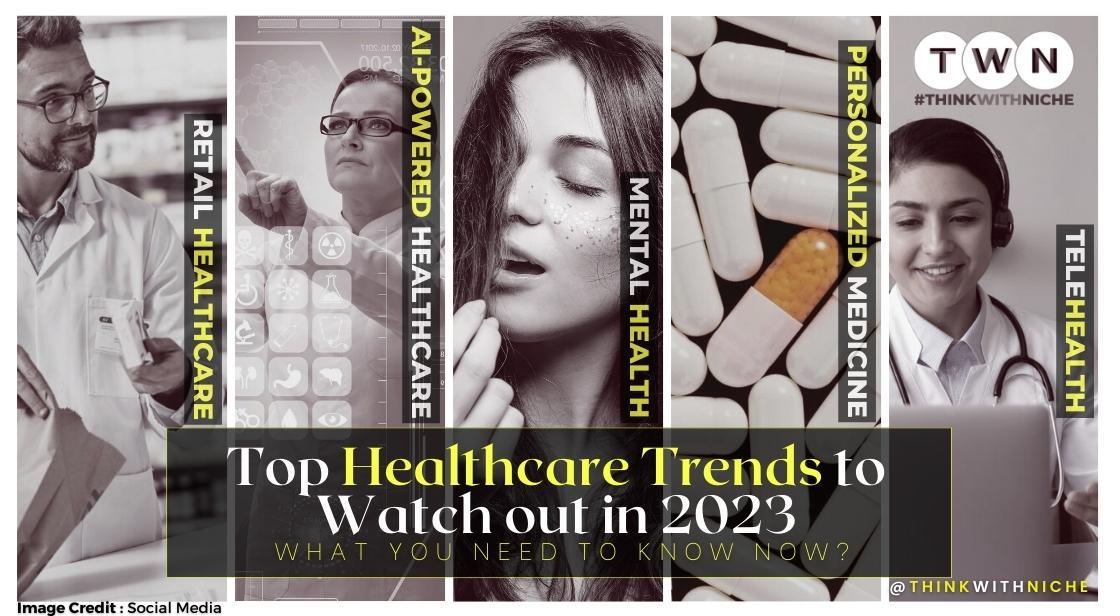Top 7 Healthcare Trends You Need To Know For 2023

Blog Post
The healthcare industry is rapidly evolving and changing, and it’s important to keep up with the trends so you can make sure you’re up-to-date on the latest developments. In this article, we’ll discuss the top 7 healthcare trends you need to know for 2023. From changes in technology and digital innovations to the rise of telehealth, these trends will shape the future of healthcare and how we provide care.
We’ll also look at how healthcare professionals can leverage these trends to improve patient care and outcomes. We’ll discuss the opportunities and challenges that come with each trend, as well as the impact they’ll have on patients and providers alike. Whether you’re a healthcare professional or just someone interested in staying informed, you’ll find this article a valuable resource. By understanding the trends, you’ll be better equipped to keep up with the ever-changing healthcare landscape and serve your patients accordingly. So, let’s dive in and explore the top 7 healthcare trends you need to know for 2023.
Blog Flow:
- Telehealth: A Growing Trend
- Mental Health: Increasing Focus and Awareness
- AI-Powered Technology: Automating Healthcare
- Personalized Medicine: Tailoring Healthcare to Individuals
- Wearable Technology: Tracking Health at Home
- The Rise of Virtual Care: Streamlining Healthcare Access
- Retail Healthcare
- Conclusion
Healthcare is constantly changing, and keeping up with the latest trends can be a challenge. From telehealth to an increased focus on mental health, it's important to stay informed and up-to-date on the healthcare technology trends and digital innovations in 2023 top healthcare trends. 2023 is sure to be an exciting year, with many changes and advances in the healthcare industry. In this article, we’ll look at the top 7 healthcare trends you need to be aware of for 2023. From the emergence of AI-powered new healthcare technology to the growing need for personalized medicine, these trends will shape the healthcare industry in the coming year. We’ll discuss the opportunities and challenges that come with each trend, as well as the impact they’ll have on patients and providers alike. Whether you’re a healthcare professional or just someone interested in staying informed, you’ll find this article a valuable resource. So get ready to learn about the top 7 healthcare trends you need to know for 2023.
Top 7 Healthcare Trends You Need to Know for 2023
1. Telehealth: A Growing Trend
Telehealth is increasing in popularity, and it’s easy to see why. This technology allows people to interact with healthcare providers via secure video calls, enabling them to receive support for their medical issues anywhere at any time. This can greatly benefit the elderly, those with disabilities, and those who live in rural areas where access to healthcare is limited. With growing numbers of people now working remotely, telehealth can also be a great solution for healthcare providers who want to interact with their patients digitally. This allows them to provide healthcare services in a more cost-effective way, while also improving access to care and facilitating better overall care coordination. Telehealth technology is also evolving rapidly, with more and more providers now offering artificial intelligence-powered virtual care assistants. These chatbots let you ask questions, receive advice, and have a virtual conversation with a real doctor or nurse — all without needing to actually speak to someone if you don’t want to. These advancements in telehealth offer a lot of promise for the industry, making it a trend that’s sure to grow even more in the next few years.
2. Mental Health: Increasing Focus and Awareness
The importance of mental health is increasing, with more attention being paid to it by the media and healthcare providers alike. There are many ways in which mental health can be improved, including regular exercise, a healthy diet, and good social support. And while these things are important no matter what your mental health status is, they can be particularly helpful for those who are struggling with mental health conditions. More people are being diagnosed with mental health conditions every year, leading to increased demand for mental health services. To meet this growing demand, healthcare providers are increasingly offering mental health services. Many are also adopting a mental health first aid model, which focuses on early detection and intervention for mental health issues. This is a great step toward increasing awareness around mental health and helping those in need receive the help they need. There has also been a rise in telepsychiatry services, which let you interact with a psychiatrist via a secure video call. This allows patients to have therapy sessions from the comfort of their home, without having to travel to a clinic. This can be particularly beneficial for people who have disabilities that make it difficult to travel, as well as those who don’t have easy access to mental health services.
3. AI-Powered Technology: Automating Healthcare
Artificial intelligence is transforming the healthcare industry, automating many aspects of patient care. This includes the way providers manage patient data, as well as the way they communicate with patients. AI-powered technology is being used in a variety of ways, including to tackle the rising costs of healthcare. Tools like data analytics, machine learning, and image recognition can help providers reduce costs by optimizing their operations. They can also help providers improve efficiency and access to care by providing patients with self-management tools. For example, AI-powered apps can now analyze your health data to provide personalized diet and fitness plans. AI-powered technology can also help healthcare providers communicate more effectively with their patients. For example, AI-powered voice assistants are now being used to help patients manage chronic conditions. This makes it easier for people to adhere to their treatment plans, as well as stay informed and connected with their healthcare team. AI-powered technology is also being used to provide patients with more personalized and engaging care. For example, chatbots can be used to get tips, advice, and recommendations for improving your health. They can also be used to provide psychological support, helping people deal with mental health issues. All in all, AI-powered technology is automating much of the healthcare industry, leading to a more efficient and personalized system.
4. Personalized Medicine: Tailoring Healthcare to Individuals
The rise of personalized medicine has made it possible to tailor healthcare to individuals. This is achieved through DNA sequencing, which allows you to analyze your genetic makeup and identify your risk factors. Providers are now also using artificial intelligence to analyze your DNA, helping you understand your health risks and how you can improve your overall well-being. This personalized approach to healthcare is becoming increasingly important, as a growing number of people are identifying as multi-ethnic. This means there are now more people with mixed ethnicities, who may have higher risk factors for certain conditions based on one ethnicity, but not others. For example, someone of mixed African-American and Asian heritage may have an increased risk of heart disease, but not diabetes. Genetic sequencing allows you to identify your risk factors based on your DNA, regardless of your ethnicity. This personalized approach to healthcare is expected to grow in the coming years, helping people receive the care they need based on their genetic makeup.
Also Read: Sustainable Business Impact On Future
5. Wearable Technology: Tracking Health at Home
Wearable technology is transforming the healthcare industry, helping people track their health and progress at home. For example, fitness trackers are now being used to diagnose health conditions, like sleep apnea. Other wearable devices, such as smartwatches, are being used to monitor blood glucose levels. This helps people with diabetes track their blood glucose at home, reducing their reliance on finger pricks. Wearable technology is also being used to monitor mental health, providing people with tools to track their emotional state. This can be particularly helpful for people with mental health issues, as it can be difficult to notice changes in your mood or emotional state. By tracking these things, you can identify potential issues earlier, and take action to address them before they become a problem. Wearable technology is set to grow in the next few years, making it a valuable trend to be aware of in the healthcare industry.
6. The Rise of Virtual Care: Streamlining Healthcare Access
A growing number of healthcare providers are now offering virtual care. This includes services like video visits and telehealth, as well as online patient communities and social networks. Virtual care allows patients to access certain services online, instead of having to visit a clinic in person. This can be helpful for people who live far from a provider, as well as those who have disabilities that make it difficult to get to a clinic. For example, patients can now speak to their doctor via a video call, allowing them to receive the same level of care as someone who visits their provider in person. Virtual care has proven to be a great asset for patients, but it’s also been beneficial for providers. Providers can now offer their services to a wider audience, helping more people access the care they need. While virtual care is expected to grow in the next few years, there are some challenges associated with it, including maintaining the same level of quality as in-person care.
7. Retail Healthcare: Offering Healthcare Services
Retail healthcare is a growing trend, with more and more retailers offering healthcare services. This includes in-store clinics, where people can receive treatment for minor illnesses and injuries. It also includes pharmacies, which are increasingly offering services like health assessments and vaccinations. And while these services are great, they aren’t meant to replace regular doctor visits. Instead, they’re meant to supplement them, giving people access to care when they might not otherwise have it. Retail healthcare can be helpful for people who don’t have ready access to a doctor, or who need minor treatment for a health condition. However, it isn’t meant to replace a regular healthcare provider, and it’s not guaranteed to provide the same standard of care. That being said, retail healthcare is an interesting trend worth keeping an eye on.
Conclusion
Healthcare is constantly changing, and keeping up with the latest trends can be a challenge. From telehealth to an increased focus on mental health, it’s important to stay informed and up-to-date on the top healthcare trends. 2023 is sure to be an exciting year, with many changes and advances in the healthcare industry. From the emergence of AI-powered technology to the growing need for personalized medicine, these trends will shape the healthcare industry in the coming year.
You May Like
EDITOR’S CHOICE












